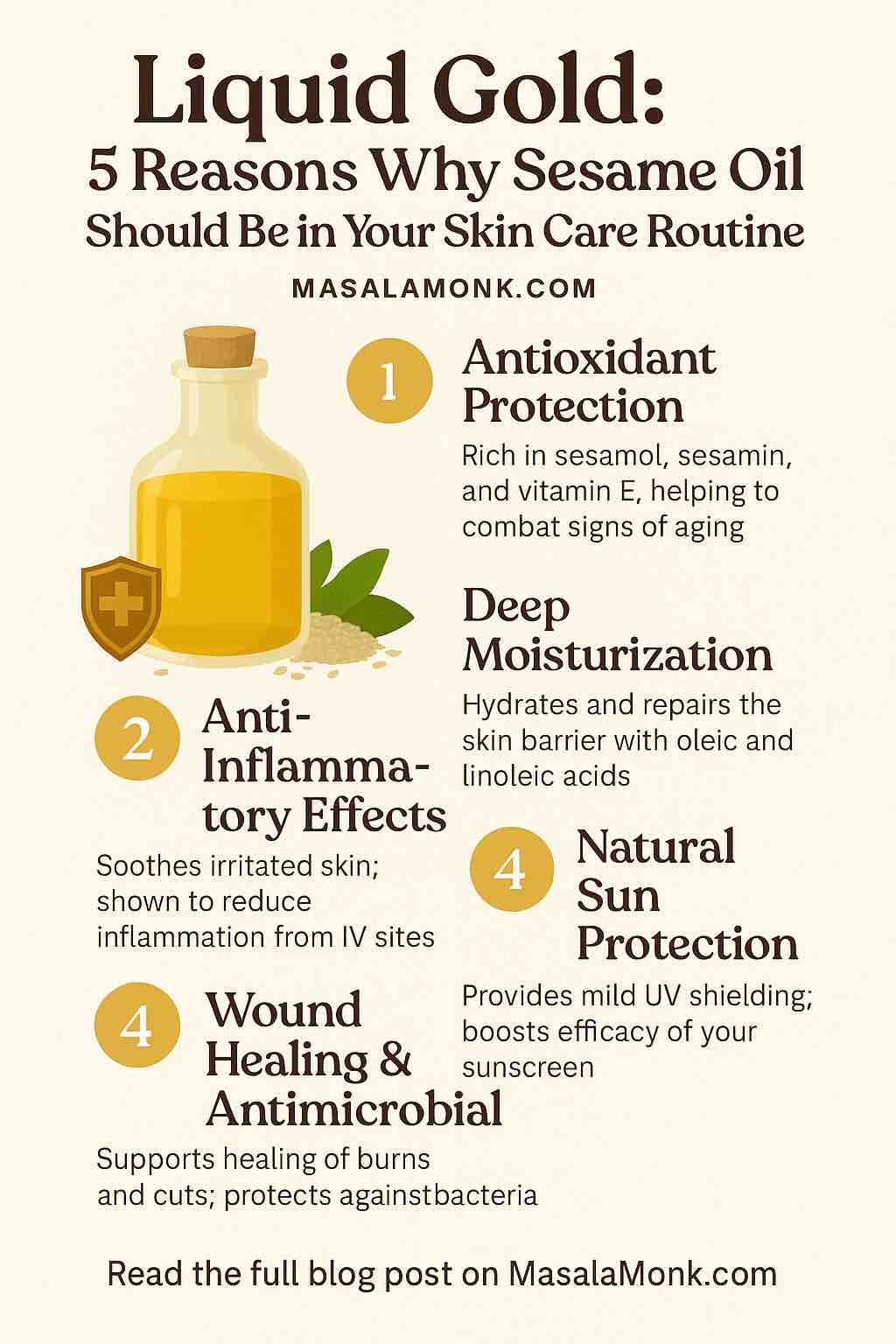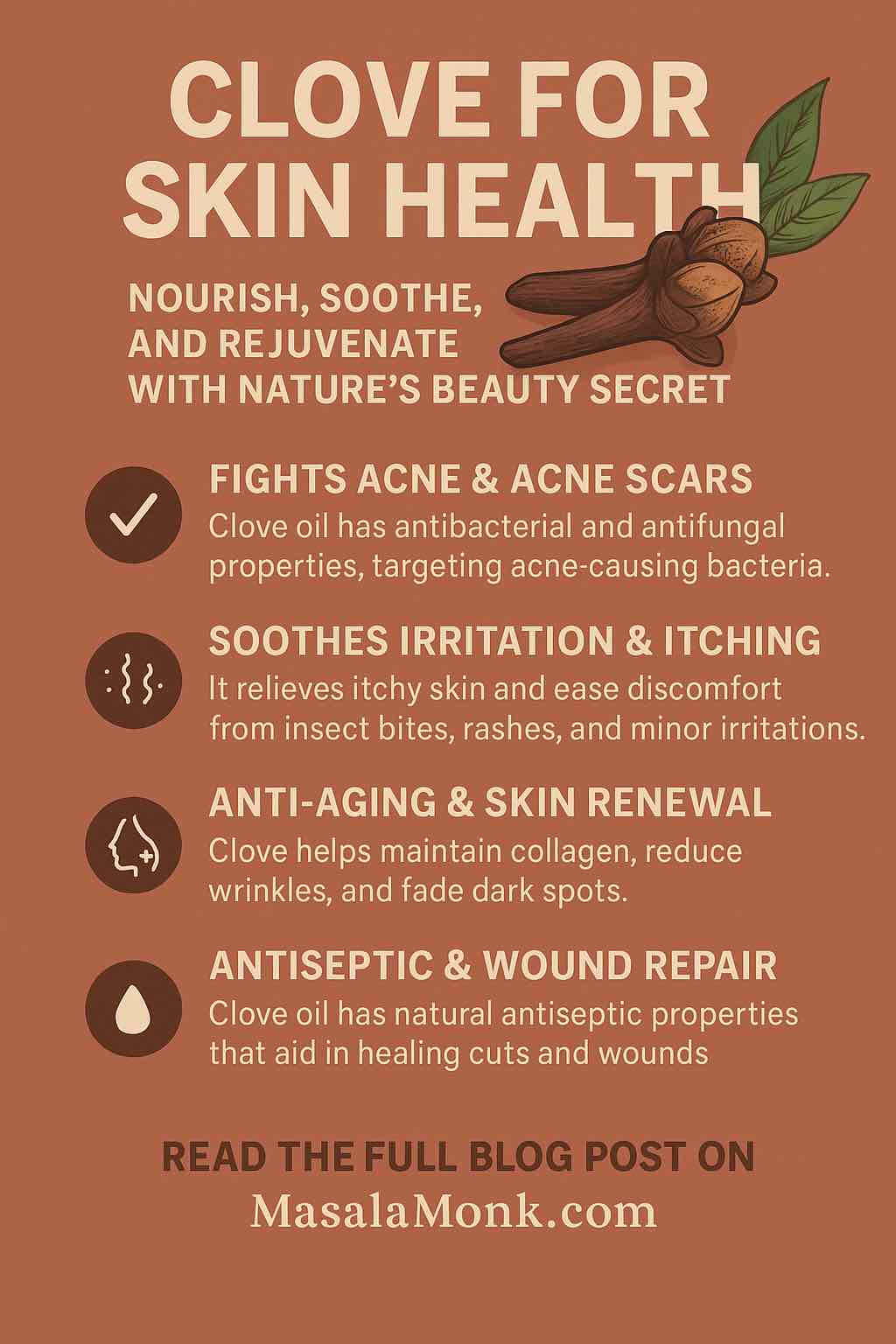
For centuries, sesame oil has been a hidden gem in wellness traditions—prized in Ayurveda, ancient Egyptian rituals, and East Asian beauty practices. But as modern science shines a light on its powerful benefits, it’s easy to see why beauty insiders now call it “liquid gold.”
From fighting wrinkles to calming irritated skin, sesame oil is having a major skincare moment. Let’s unpack the latest research, the practical benefits, and how you can use this humble oil for healthy, radiant skin—whatever your skin type.
1. Potent Antioxidant Protection—Your Anti-Aging Ally
What the science says:
Sesame oil is packed with natural antioxidants, especially sesamol, sesamin, and vitamin E. New studies published in 2024 reveal that sesamol not only neutralizes free radicals (which cause skin aging and dullness) but may also protect collagen and reduce damage from daily UV exposure.
Why it matters:
- Shields skin from environmental stress and pollution
- Softens the look of fine lines and wrinkles
- Keeps your skin looking fresh and vibrant
Pro tip:
Use sesame oil as a nighttime face oil. Massage a few drops into clean, damp skin before bed—wake up to a healthier, glowing complexion.
2. Deep Moisturization & Barrier Repair
What the science says:
Sesame oil contains over 80% unsaturated fatty acids, mainly oleic and linoleic acids, which are essential for locking in moisture and repairing the skin barrier. Recent clinical studies have shown that one application of sesame oil can boost skin hydration by as much as 30%.
Why it matters:
- Ideal for dry, flaky, or winter-stressed skin
- Restores the skin’s natural barrier, preventing water loss
- Leaves skin feeling soft—not greasy
How to use:
Apply 3-5 drops to your face and body after showering, when skin is still damp. You can also add a few drops to your favorite body lotion for an extra moisture boost.
3. Anti-Inflammatory & Soothing for Sensitive Skin
What the science says:
Recent randomized clinical trials (2023–24) and meta-analyses found sesame oil reduced inflammation and irritation in hospital patients—most notably, it helped prevent and soothe phlebitis (vein inflammation) at IV catheter sites.
Why it matters:
- Calms redness, itching, and minor rashes
- Supports healing for burns, wounds, and eczema
- Great for sensitive or reactive skin types
How to use:
For irritated or inflamed areas, dab a little sesame oil on a cotton pad and gently apply to the skin. For all-over soothing, use it as a massage oil after sun exposure or during harsh weather.
4. Natural—But Mild—Sun Protection
What the science says:
While not a substitute for sunscreen, in vivo research from 2024 confirms sesame oil provides mild shielding against visible and infrared light, thanks to its unique lignans and antioxidants.
Why it matters:
- Adds another layer of protection from daily environmental stress
- Boosts the efficacy of your usual sunscreen
- May help prevent some forms of UV-related aging
How to use:
Layer a few drops of sesame oil under your regular broad-spectrum SPF for enhanced antioxidant defense. Remember: never use oils as your only sun protection.
5. Supports Wound Healing & Fights Bacteria
What the science says:
Comprehensive reviews in 2024 highlight sesame oil’s value for wound healing. In one study, burns treated with sesame oil healed significantly faster and with less scarring than those treated with vaseline or left untreated. Its natural antimicrobial properties also help prevent infection.
Why it matters:
- Useful for cuts, scrapes, and mild burns
- Reduces risk of infection on minor wounds
- Can be added to DIY balms and ointments
How to use:
Clean the affected area, then gently apply a drop or two of sesame oil. Cover with a sterile bandage if necessary.
How to Choose & Use Sesame Oil Safely
Tips for the best results:
- Go for cold-pressed, unrefined oil. This keeps the antioxidants and nutrients intact.
- Patch test first, especially if you have allergies or sensitive skin.
- Store in a cool, dark place to prevent oxidation.
- Check the label: Cosmetic-grade oil is best for facial use, as it’s more purified and less likely to clog pores.
Comedogenic rating:
Refined sesame oil rates “1” (low), unrefined rates “3” (moderate). If you have acne-prone skin, start with refined oil and spot test before full use.
Real-World Ways to Use Sesame Oil in Your Routine
- Nighttime Facial Oil
After cleansing, apply 2-3 drops to your face and neck. - Body Moisturizer
Use on damp skin post-shower for deep hydration and a healthy glow. - Soothing Massage Oil
Warm slightly and massage into tense muscles or dry patches. - Gentle Makeup Remover
Massage into the skin to dissolve makeup, then wipe off with a warm, damp cloth. - Spot Treatment for Irritations
Dab onto bug bites, minor burns, or eczema patches.
💡 Practical Applications of Sesame Oil
| Use Case | How to Use |
|---|---|
| Moisturizer | Massage 3–5 drops into damp skin post‑shower for hydration and softness. |
| Soothing treatment | Dab on irritated patches or minor burns; contains anti‑inflammatory and healing agents. |
| Makeup remover | Perform oil cleansing by gently massaging into skin and rinsing. |
| Natural SPF booster | Layer under sunscreen or mix into carrier-based SPF for extra antioxidant support. |
| Spot treatment | Apply to wounds, eczema, or dry patches to leverage antimicrobial and healing effects. |
The Bottom Line: Is Sesame Oil Right for You?
Modern science now backs what traditional medicine has known for centuries: sesame oil is a true multitasker for healthy, resilient skin.
Its ability to hydrate, soothe, heal, and protect makes it a smart addition to nearly any routine—especially if you’re looking for natural, multi-benefit skincare.
Remember:
Always pair sesame oil with a balanced regimen—gentle cleansing, broad-spectrum SPF, and hydration tailored to your skin’s needs.
Ready to try liquid gold for yourself?
Let us know your results—or favorite sesame oil skincare hacks—in the comments!
10 Frequently Asked Questions (FAQs) About Sesame Oil for Skin Care
1. Is sesame oil safe for all skin types?
Yes, sesame oil is generally safe for most skin types, including dry, normal, and mature skin. If you have oily or acne-prone skin, start with a small amount or opt for refined sesame oil, which is less likely to clog pores. Always patch test before regular use.
2. Can sesame oil clog pores or cause breakouts?
Sesame oil has a moderate comedogenic rating (1 for refined, 3 for unrefined), meaning it’s less likely to clog pores than coconut oil. If you’re acne-prone, use refined oil and patch test. Discontinue if you notice any breakouts.
3. How does sesame oil compare to coconut or olive oil for skin?
Sesame oil is lighter and absorbs faster than coconut oil, making it less greasy. It’s also less comedogenic than coconut oil and contains unique antioxidants not found in olive oil, making it excellent for barrier repair and antioxidant support.
4. Can I use sesame oil as a sunscreen?
No, sesame oil provides only mild natural sun protection (SPF 2–4) and should never replace a broad-spectrum sunscreen. Use it under or alongside SPF for added antioxidant benefits.
5. Is sesame oil suitable for sensitive or eczema-prone skin?
Yes, many people with sensitive, irritated, or eczema-prone skin benefit from sesame oil’s soothing and anti-inflammatory properties. Always patch test on a small area first.
6. How should I store sesame oil for skin care?
Store sesame oil in a cool, dark place away from heat and sunlight. Use within six months of opening to ensure potency and freshness.
7. Can sesame oil help with scars or wound healing?
Emerging research supports sesame oil’s ability to speed up wound healing and reduce scarring thanks to its antioxidants and fatty acids. Use on clean, minor wounds; for serious injuries, always consult a doctor.
8. Is it safe to use sesame oil on children or babies?
Sesame oil is used in baby massage in many cultures and is generally safe, but always use pure, food-grade, cold-pressed oil. Do a patch test first and avoid use on open wounds or broken skin.
9. Does sesame oil have any scent?
Unrefined sesame oil has a light, nutty aroma. Refined oil has little to no scent, making it better for those sensitive to fragrances.
10. Can I use sesame oil with other skin care products?
Absolutely! Sesame oil can be layered under or over most moisturizers, serums, and SPFs. It also mixes well with essential oils (for massage) and can be added to DIY masks or creams.










